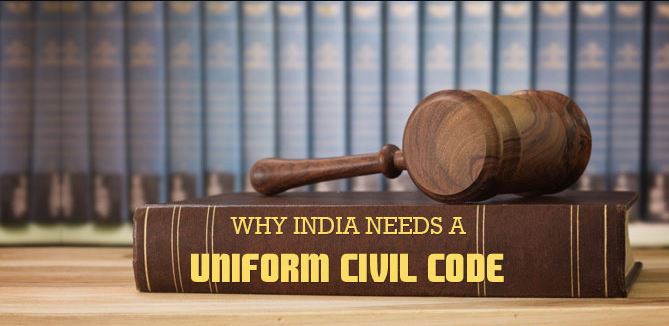Uniform Civil Code is at a trending point in the country and every citizen of this country have tilted to either side. Uniform Civil Code has received mixed reviews but without proper knowledge we cannot determine that whether the existence of the Uniform Civil Code will hamper the current personal laws or not which have been already implemented throughout India. The Criminal laws like IPC, PMLA, NDPS etc., Civil laws like CPC, Tort, Transfer of Property etc. Or evidence act, these laws are implemented throughout the country and every citizen regardless of their religion, gender and sexual orientation are treated equally before the eyes of law.
We have to take a look and understand what is Uniform Civil Code. Uniform Civil Code is a way of formulating personal laws which can be implemented on all the citizens equally regardless of their religion, gender and sexual orientation. Many Countries like U.S.A, Pakistan, Bangladesh, Malaysia, Turkey, Indonesia, Egypt and Ireland have implemented Uniform Civil Code but there is one major difference between these countries and India is that one of the largest democracy in the world along with the largest diversity in the world. The debate regarding the implementation of Uniform Civil Code goes back to a period of British Rule.
Before the British rule India had great diverse culture and every religion or tribe followed their own customary regulations and norms. Those cultural practices were performed for thousands of years and then these religious practices became an important part of the Indian Citizens which could not be avoided. The Hindus, Muslims, Christians, Parsi etc. all followed their own set of customs regarding marriage, divorce, inheritance etc. Under the rule of Britishers which saw this diversity as an opportunity to rule over India and create Divide and Rule Policy. So, the Britishers introduced a version of codified laws relating to criminal, evidence and contracts, but the personal laws of Hindus and Muslims were left out of it intentionally.
Post Independence the codification of personal laws were one of the biggest concerns of the government. During that time also Uniform Civil Code faced many criticism, so the government decided to codify Hindu Law first and Hindu Code Bills was introduced in the parliament which faced with criticism and the main provisions opposed were those concerning monogamy, divorce, abolition of coparcenary (women inheriting a shared title) and inheritance to daughters. Thus, a lesser version of this bill was passed by the parliament in 1956, in the form of the Hindu Marriage Act, Succession Act, Minority and Guardianship Act and Adoptions and Maintenance Act. These diluted versions were in contradiction to the implementation of a uniform civil code in Article 44 of the Directive principles of the Constitution specifying, “The State shall endeavour to secure for citizens a uniform civil code throughout the territory of India.” Article 44 paved a way for the governments to implement Uniform Civil Code in their respective states or implement a Single Uniform Civil Code throughout India. One example of the Uniform Civil Code in India is Goa. Goa had implemented Common Civil Code in 1962. That common civil code also cannot be called Uniform because of its anomalies, like firstly for the non Christians there is cap of 15 Days for registration of marriage and both times signatures to be done before the Marriage Registrar but for the Catholics or Christians the second signature is done in the church before the church registrar. Secondly, In Goa for Hindus there is a special provision that if the wife is 25 years of age and she had not conceived any child then the husband has right to marry again with the consent of wife or If wife is 30 years old and she has not conceived any son then also the husband can marry again with the consent of wife. Hence there are more examples in the Goa Civil code which has this type of biasness.
So , today the implementation of Uniform Civil Code has major obstacles in its way. We have to realize the truth that implementation of The Uniform Civil Code cannot be done in a haste. There are many factors to be considered before making laws practical for the whole country. First and most important thing is to consider that any law in the Uniform Civil Code does not violate any customs or norms of any religion. We have to take a hard look on the main purpose of the Uniform Civil Code that is all religions will be governed under single code of personal law. No law or code should hurt any religious group or destroy customs of any religion.
At last there is no guarantee that the Uniform Civil Code will be good because if all religions and tribes be covered in one code still the people will be differentiated through their religions and caste. This is a game of patience in which the government, judicial system and legislators will have to come together and take ample time to create that Uniform Code which covers all aspects and deals with every major or minor issues and most important that it should have lot of flexibility because there will be many times that change will be needed because with time Society changes and then it creates a need to change the law as well.



A Well written and an Informative Article. The UCC although focus of unification of laws for people’s welfare but it cannot be denied that it somewhere challenge the concept of the secularism provided in Indian Constitution.